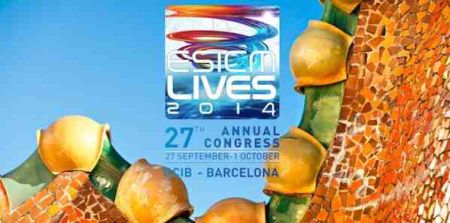European Society of Intensive Care President, Jean-Daniel Chiche, tonight welcomed delegates to ESICM Lives 2014, the 27th Annual Congress of the Society. He reminded delegates what LIVES stands for - linking innovation vision excellence & science. Once again the programme will deliver innovation, excellence and more, he added.
Chiche noted that this congress marks the first time that a whole three sessions are devoted to randomised controlled trials (RCTs). Intensivists can be very proud of a field that is so dynamic and creative. he said.
In surveying the work of the Society, now with more than 7100 members, Chiche singled out the Society’s work on research and education.
Chiche commended the work of the ESICM Trials Group, which already includes more than 16000 patients in clinical trials. The Group holds a networking event on 30 September.
Chiche praised the NEXT programme, now two years old, which is developing the new generation of intensive care leaders. Due to launch in 2015 is the ICE-mentoring project, which will allow virtual mentoring.
ESICM Honorary Memberships were awarded to Julie Benbenishty (the first nurse to receive the honour), Veerappan Chithambaram and Arthur Slutsky. The ESICM medal went to Jukka Takala, who presented a review of his research into pathophysiology.
Derek Angus outlined what the next generation of clinical trials will look like - getting closer to individualised treatment decisions. Angus explained that the motivation for smart ‘adaptive’ trials is that they take advantage of accmulating data. Traditionally designed trials require all parameters to be fixed up front. This increases the risk of a failed trial, unnecessary patient exposure to harm and more. There are many uncertainties in designing a trial, such as optimal dose, duration, target population and so on. In an adaptive trial, however, information accumulates as patients are enrolled, and this information reduces uncertainty, and allows modification to trial parameters. Trial adaptations are pre-planned, well-defined, limited to key trial parameters and statistically valid. In adaptive trials, such information can be used to adapt for example, the target population, randomisation allocation, sample size, number of arms or primary outcome. Such adaptive trials have been conducted in oncology, and are now being conducted in the intensive care field. ESICM is the primary clinical research network for the PREPARE project, Platform FoR European Preparedndess Against (Re)emering Epidemics. PREPARE CAP is an adaptive trial that will determine the best care for severe acute respiratory failure of presumed infectious origin.
Chiche noted that this congress marks the first time that a whole three sessions are devoted to randomised controlled trials (RCTs). Intensivists can be very proud of a field that is so dynamic and creative. he said.
In surveying the work of the Society, now with more than 7100 members, Chiche singled out the Society’s work on research and education.
Chiche commended the work of the ESICM Trials Group, which already includes more than 16000 patients in clinical trials. The Group holds a networking event on 30 September.
Chiche praised the NEXT programme, now two years old, which is developing the new generation of intensive care leaders. Due to launch in 2015 is the ICE-mentoring project, which will allow virtual mentoring.
ESICM Honorary Memberships were awarded to Julie Benbenishty (the first nurse to receive the honour), Veerappan Chithambaram and Arthur Slutsky. The ESICM medal went to Jukka Takala, who presented a review of his research into pathophysiology.
Derek Angus outlined what the next generation of clinical trials will look like - getting closer to individualised treatment decisions. Angus explained that the motivation for smart ‘adaptive’ trials is that they take advantage of accmulating data. Traditionally designed trials require all parameters to be fixed up front. This increases the risk of a failed trial, unnecessary patient exposure to harm and more. There are many uncertainties in designing a trial, such as optimal dose, duration, target population and so on. In an adaptive trial, however, information accumulates as patients are enrolled, and this information reduces uncertainty, and allows modification to trial parameters. Trial adaptations are pre-planned, well-defined, limited to key trial parameters and statistically valid. In adaptive trials, such information can be used to adapt for example, the target population, randomisation allocation, sample size, number of arms or primary outcome. Such adaptive trials have been conducted in oncology, and are now being conducted in the intensive care field. ESICM is the primary clinical research network for the PREPARE project, Platform FoR European Preparedndess Against (Re)emering Epidemics. PREPARE CAP is an adaptive trial that will determine the best care for severe acute respiratory failure of presumed infectious origin.
Latest Articles
ESICM 2014
European Society of Intensive Care President, Jean-Daniel Chiche, tonight welcomed delegates to ESICM Lives 2014, the 27th Annual Congress of the Society....



























